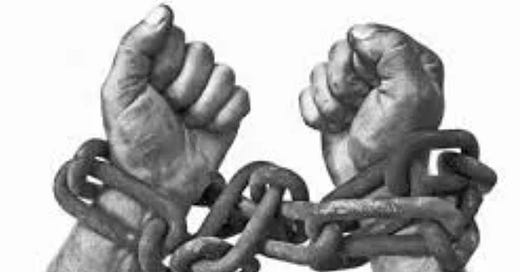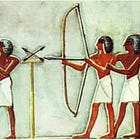In praise of the British Empire for abolishing slavery worldwide
Grand Narrative, Chapter 1.6
My new book Grand Narrative is being released chapter by chapter for paid subscribers. Thank-you for your support.
CONTENTS:
PROLOGUE: The Oxford Union has betrayed British Values
INTRODUCTION: Who’s afraid of grand narrative?
BOOK 1: LANGUAGE: ON LIES & CIVILIZATIONAL DEMISE
1.1: Living a Lie
1.2: Corruption of the Masses
1.3: The Dangerous Confusion of Language
1.4: The Great Genocide Lie
1.5: Hands off Churchill!
1.6: In Praise of the British Empire for Abolishing Slavery Worldwide
1.7: Declaring War on Post-Modernism
1.7.1: Said with “authentic feeling”
1.7.2: Done the old-fashioned way
1.8: The Problem with Atheism
1.9: Justice Lost
1.10: Word Inflation
1.11: Thou Shalt Not Lie: On the Destruction of Worlds
1.12: Freedom of speech?
1.13: Democracy cannot survive in a world that accepts lies as truth
BOOK 2: TRUTH: ON THE BIRTH OF HUMAN AGENCY
BOOK 3: SOVEREIGNTY: ON THE DEMOCRATIC NATION
BOOK 4: NARRATIVE: ON THE FULFILMENT OF MEANING
BOOK 5: FREEDOM: ON WRITING THE NEXT CHAPTER
BOOK 6: COVENANT: ON CREATING A NATION OF NARRATIVE
BOOK 7: NATIONHOOD: ON EXPANDING THE NARRATIVE
BOOK 8: LEADERSHIP: ON REACHING THE PROMISED LAND
BOOK 9: PEACE: THE END OF THE JOURNEY
Chapter 1.6: In praise of the British Empire for abolishing slavery worldwide
On rewriting the national story
“I saw in every [British] man a recognition of my manhood, and an absence, a perfect absence, of everything like that disgusting hate with which we are pursued in [the United States]” (Frederick Douglass1)
The evils of slavery
As the inversion of language continues apace in our elite higher education institutions, we are called upon to return to the original sin of revisionist thinking, namely that the British Empire was an essentially evil construct which brought the misery of slavery to the world. Nothing could be further from the truth. For, in its finest hour, it was the British Empire that spent enormous time, effort, treasure and political capital on its total abolition. And although slavery does continue to persist in the dark underworld of organised crime, it does so hidden away in shame and below the surface, knowing that in the eyes of decent people everywhere it is an abomination. That the world went from a state of near-universal slavery to near-universal abolition was something for which the British alone can take the credit. Yet in our topsy-turvy reality, where the terms genocide and apartheid can be misused to mean anything you damn well choose, it is the British who are slandered as slavers-in- chief. This intolerable, post-truth slur is something that we will endeavour to rectify today.
Before launching into this piece, let us say the following in no uncertain terms. Slavery is utterly evil. The slavery practised by British merchants operating under the Charter of the Royal African Company (or under their own lawless volition) was utterly evil2. There are no ifs, there are no buts and above all there are no maybes. The Atlantic Slave Trade, where human beings were treated as chained, starved, dehydrated, light-deprived chattels was a horrific blot on the record of humanity. The Portuguese Empire, which shipped 46.7% of the exported African slaves was the chief offender; but the second placed British, with a deplorable 26.1%, are noted next on the list of shame and for this there can be no excuses given. Neither may anyone use the risible excuse of “It was a different era”. For the British were acutely aware, according to their own morality and their own sense of the good that slavery was inexcusable, with the practice having been entirely banned under English common law for centuries prior. Just as it was unacceptable (legally as well as morally) for an Englishman to hold a slave in York or Liverpool, so it followed that slavery was a morally unwashable stain in all four corners of the Earth.
Somerton v Stewart
The British position on this horrific practice was stated plainly in the case of Somerton v Stewart (1772)3. The facts of the case can be summarised this::
James Somerset, an enslaved man, was recaptured. In a brave escapade insufficiently recorded, he fled from his “master” on return to England. Imprisoned on a ship with a view to him being removed from the country and sent to Jamaica for sale, it was for the English justices to have their say. Under the long standing legal principle of Habeas Corpus, no person could have their freedom restricted by the State, nor by a private individual, without a positive law which gace them authority to do so. Yet as we know, slavery was widespread throughout the 13 Colonies and the early British Empire.
So did anyone have the authority to restrict the liberty of Mr Somerset? The judge Lord Mansfield knew he had a fateful decision to make that would raise the ire of many:
“ We feel the force of the inconveniences and consequences that will follow the decision of this question.”
But he was bound by the law, not commerce or geopolitics:
“So high an act of dominion must derive its authority, if any such it has, from the law of the kingdom where executed. .. The state of slavery is of such a nature that it is incapable of being introduced on any reasons, moral or political, but only by positive law.”
Slavery had never been authorised either by the common law or by legislation, so the answer to the legal question was clear; particularly so given the “odious” nature of the practice. In a judgment that has made his Lordship live in history, Lord Mansfield held:
“In a case so odious as the condition of slaves, [the need for there to be positive law] must be taken strictly, the power claimed by this return was never in use here; no master ever was allowed here to take a slave by force to be sold abroad because he had deserted from his service, or for any other reason whatever; we cannot say the cause set forth by this return is allowed or approved of by the laws of this kingdom, therefore the black (slave) must be discharged.”
Lord Mansfield made no mention of the situation of slaves in the British Empire (as opposed to in England and Wales), but the precedent was set. The abolitionists were emboldened. The end of slavery was coming.
Britain stands alone
Yet let us take pause; and refresh our minds with the point just made. Slavery was totally illegal throughout the British island. To modern eyes, this seems scarcely worthy of comment; but at the turn of the 19th Century it was a phenomenon that made Britain an island in every sense of the word. For throughout the Earth, outside of our one secluded corner, slavery was a living and accepted reality; one which Britain alone stood against proudly. From China to Japan, from the Incas to the 13 colonies, from Africa to throughout the Islamic world, slavery was as entrenched as it was outrageous4. And lest we forget that before “free Algeria” was colonised by the French it was the base for Barbary pirates who raided English ships - and even English towns as far away as Cornwall - to bring white slaves to market5. Indeed the Muslim slave trade as a whole exceeded by roughly 6 million the number of slaves shipped by Europeans. But this isn’t a competition in evil. The British, the Portuguese, the Arabs and the Aztecs were all equally culpable and their behaviour was as inexcusable then as it would be now. Yet let us be clear: no culture and no Empire, whether white or non-white, rode the seas and traversed the deserts with clean hands.
The extraordinary thing about the British was not that they were as evil as everyone else abroad, it was that they were better than everyone else at home; and most significantly of all it was they that destroyed the international slave trade forever. Before considering how they achieved this, we would do well to consider that the cause of abolition was not the preserve of a small progressive elite. It was the will of the entire nation. True enough, intellectuals took the lead. But the historical figures who did so are hardly to be regarded as left-wing. One of the most eloquent anti-slavery campaigners was a certain Adam Smith, not a figure ordinarily regarded as an avid socialist6.
Even more in the vanguard were those very streams of Christianity which American progressives are so want to criticise. Alongside the Quakers, the evangelical wing of the Church of England was outspoken in its criticism, particularly John Wesley, the Anglican vicar cum founder of Methodism7. But, and this is important to emphasise, the desire to abolish slavery was so widespread in the nation that it could be classified as a populist cause. In one of the most extraordinary statistics one could hope to encounter, in 1791, around 30% of the British male population signed anti-slavery petitions8. Which is to say that this single cause of ethical foreign policy had more legitimacy that the recently elected Keir Starmer government which scraped home with approximately one fifth of eligible voters. The British people were against slavery at home and against slavery abroad.
Actions, not words
Yet Britain’s signature achievement cannot be captured in the mere description of Acts passed into law. For though the Mother of Parliaments voted to abolish the slave trade in 1807, followed 26 years latter by the banning of slavery itself, that would have been of little import unless these laws had been followed through to implementation. And it is the British government’s absolute determination to defeat slavery the world over - in actions as well as words - that will leave the reader dumbfounded in pride.
[To continue reading, consider becoming a paid subscriber. The author is trying to change his life and needs your help.]
Keep reading with a 7-day free trial
Subscribe to Guerre and Shalom to keep reading this post and get 7 days of free access to the full post archives.






![Living a Lie [Grand Narrative, Chapter 1.1]](https://substackcdn.com/image/fetch/$s_!WsuS!,w_140,h_140,c_fill,f_auto,q_auto:good,fl_progressive:steep,g_auto/https%3A%2F%2Fsubstack-post-media.s3.amazonaws.com%2Fpublic%2Fimages%2Fca972889-18bb-4d7b-a496-c65cc50d7fa6_1035x696.jpeg)


![The Great Genocide Lie [Chapter 1.4]](https://substackcdn.com/image/fetch/$s_!ji7r!,w_140,h_140,c_fill,f_auto,q_auto:good,fl_progressive:steep,g_auto/https%3A%2F%2Fsubstack-post-media.s3.amazonaws.com%2Fpublic%2Fimages%2F04b0ba56-f1e5-4c92-a36a-85294ea84ccb_1014x735.jpeg)
![Hands off Churchill! [Chapter 1.5]](https://substackcdn.com/image/fetch/$s_!6scA!,w_140,h_140,c_fill,f_auto,q_auto:good,fl_progressive:steep,g_auto/https%3A%2F%2Fsubstack-post-media.s3.amazonaws.com%2Fpublic%2Fimages%2F2e1bc915-fb46-419c-8929-1cd34dd68648_841x695.jpeg)
